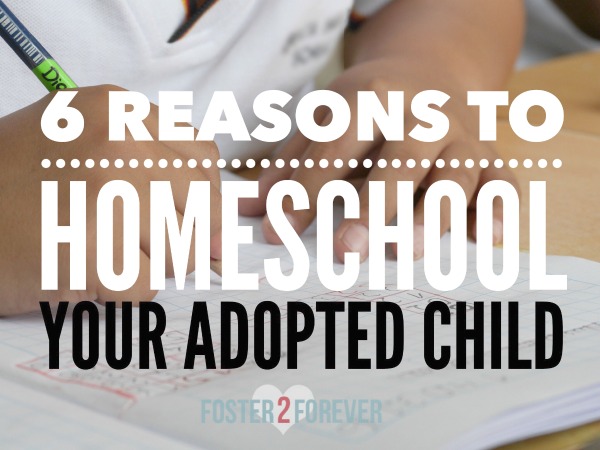WHY HOMESCHOOL YOUR ADOPTED CHILD?
School can be overwhelmingly stressful for a young child – but add to that a history of trauma, a new language, separation from parents, peer pressure, developmental or social delays – and an adopted child can struggle with big emotions, not only at school, but at home too. After our middle son’s behavior problems at school and taking FMLA family leave to be with him, we have decided to homeschool our youngest this year. Our LilBit’s anxiety at school has begun to effect him even at home.
6 REASONS TO HOMESCHOOL YOUR ADOPTED CHILD
1. BUILD CONNECTION IN YOUR RELATIONSHIP
The #1 priority of an adoptive parent is building a bonded relationship with your adopted child. By not sending your child off to school every day and keeping your child close during the day, you can focus on building your relationship. The one-on-one relational opportunities of homeschooling your adopted child allows you to get to know his individual learning style, his personality, and make memories together as a family. (Read about attachment types here)
2. SPECIALIZED ACADEMICS
While homeschooling, your adopted child can receive the individual academic instruction that he may need to “catch up.” The academic pace can be determined by the child’s rate of learning, especially important if your child was exposed to alcohol in utereo and may suffer the effects of FASD. If a child can quickly grasp a concept, then you can move quicker through a curriculum or unit study; likewise a slower pace will help your child actually master a skill before moving on. In a classroom setting, a teacher has a set pace for all the students, whether they are ready to move on or not — classroom teachers are in a position in which they have to teach to the middle, with bright students being bored, and students with challenges becoming more and more frustrated.
An adopted child may have special needs that are becoming more and more difficult to accommodate within school districts. The process for a child to even qualify for special education services is becoming more and more complicated. However, even if you homeschool, school districts still have to provide certain special services to children who live in their district, whether or not the child is enrolled.
Another academic benefit of homeschooling your adopted child is that whether your child is an auditory learner, visual learner, or kinesthetic (tactile) learner, you can teach in the style that your child best learns. Also, if something in your teaching approach or curriculum isn’t working, you have the flexibility to just change it and specialize it to your child as you wish. While homeschooling my oldest, it took me three tries to finally find a spelling curriculum that actually taught one spelling rule at a time.
Also, due to the likelihood of early neglect, many adopted children have sensory processing disorder and needs that aren’t being met or are disruptive in a classroom. In homeschool, you can incorporate your child’s therapy and sensory needs and focus on your child’s development as a whole. Also, if you adopted internationally, you can immerse your child in learning the English language in your homeschool without the added pressure of “academic performance.”
3. FLEXIBILITY
Homeschooling provides an adoptive family the flexibility to make appointments with the various professionals without dealing with rigid school attendance policies. While homeschooling, you can make appointments with caseworkers, counselors, specialists, therapists at your convenience.
This is what Sharla Kostelyk of Chaos & the Clutter, an adoptive mom of 7, says about the flexibility of homeschool: “We can homeschool when we want to and where we want to. We can move through curriculum as quickly or as slowly as we want to or need to. We can stop in the middle of something and decide that if a program isn’t working for us, we can ditch it and try something else. If the kids decide that they are super interested in something mid-year, we can add in a unit study about it at the time they are actually interested and will better retain what they learn.”
Homeschooling families can even plan vacations at off-peak times that are less crowded and easier on the pocketbook too. Royal Caribbean is currently having a promotion of 30% off plus kids sail free! Of course, the best priced sail dates are when school is in session, perfect for homeschool families. In October a few years ago, our family took a Disney Cruise vacation out of Galveston, and our kids sailed FREE!
4. POSITIVE SOCIALIZATION
Socialization seems to be everyone’s concern when it comes to homeschool. “How will your child get socialized if they just stay home all day?” That’s a common misconception — We don’t stay home every day. Homeschool groups are everywhere with play dates, field trips, and even group classes – so a child doesn’t have to be in a bubble by himself. Add to that any church, sports or other youth activities or clubs, and a child will have numerous opportunities to develop friendships with other children.
Besides, the “socialization” in a school setting is not particularly positive. Bullying is the norm in schools nowadays. And school administrators just can’t make bullying against the rules — “pecking orders” are an instinctive survival skill in groups all across nature. Plus, in what other settings in life (after college) will an adult be surrounded only by people the exact same age? Never. A child learning how to get along in groups of various ages is a more appropriate life skill that can be developed in a homeschool environment.
While homeschooling your adopted child, you have the ability (and time) to devote to developing social skills. You can work on developing coping skills one-on-one as issues arise to give children the social skills they may be lacking before going out into the world as adults. You have the ability
5. REDUCE ANXIETY
School is stressful, not only in regard to academic performance, but, as stated above, peer pressure can be excruciating. An adopted child who is overcoming trauma, may not be at the same emotional maturity as classmates, and risks being ridiculed by classmates for the smallest of things. What homeschooling does is allow a child to be who his is, where he is developmentally without being concerned about what other kids think of him. A child doesn’t have the added pressure of being in a school environment where differences are pointed out and ridiculed by classmates. Homeschooled children have the freedom to be themselves, and have their own unique interests. Our youngest son, LilBit, is extremely shy and feels uncomfortable in large groups. By taking away the stress of school, which is overwhelming to him, he can relax and be the happy child that he is.
6. TALENTS & INTERESTS
When you homeschool, as the curriculum director, you can focus on a child’s strengths, talents, and interests. You have the flexibility (and time) to pursue your child’s interests, whether musical, athletic, or otherwise. In homeschool, your child will have the time to participate in those extracurricular activities that “homework” and bedtimes can get in the way of. And you can even base some of your curriculum on the life and leadership skills that organizations such as 4-H and Boy Scouts develop. Whatever your child’s interests are, your child can participate in martial arts to encourage self-control, robotics or STEM programs for your mechanically-inclined child. The possibilities are endless.
Although homeschooling may not be an option for everyone, the benefits of homeschooling certainly make it worth examining for adoptive families to thrive. I successfully homeschooled our oldest son, Bubba, for two years. We had been doing homework every single night for four hours anyway, and we realized that we were, in all effects essentially homeschooling him anyway. Those two years were the best for him. I taught at his level, for his kinesthetic learning style, exploring his interests, and he flourished. His self-esteem soared. “Wow! I’ve never been this good at math before!”





